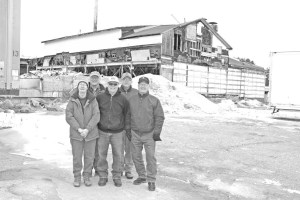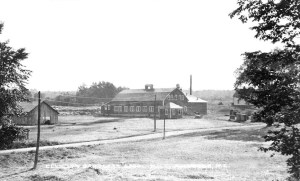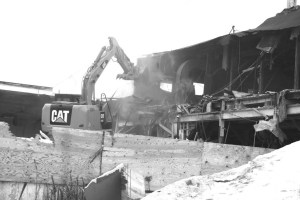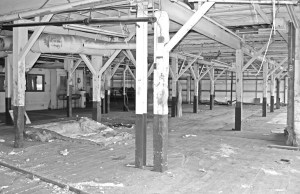ANDOVER — The century-old Andover spool mill building has been taken down, and members of the family who formerly owned it were watched and reminisced about its heyday.
The mill, along with many others in the state, was owned in the 1920s through early 1950s by the Stowell family. The mill made wooden spools for thread.
Brothers Peter and George Stowell of West Gardner and Falmouth, respectively, and their cousins David and John Percival and Paula Smith of Andover grew up in Andover in the 1940s and 50s.
Peter has written about the family mills.
His great-grandfather, Newton Stowell of Dixfield, began buying and building spool mills around 1903 and wound up owning mills in Dixfield, Andover, Bryant Pond, Weld, Philips, Farmington Falls, North Anson, North New Portland and Bethel, according to Peter.
“Additionally, he owned sawmills all around Oxford and Franklin counties. More than 20 have been identified,” Peter said.
The Andover mill, known originally as the Elliot and Bartlett Spool Mill, was built around 1918, the year the owners’ mill in Albany burned, he said.
Rather than rebuild that one they built one in Andover “to be near an untapped and plentiful supply of white birch, the wood used nearly exclusively for spools for cotton thread,” Peter said.
Newton Stowell bought the mill in the 1920s.
After many years of operation by his son, George P. Stowell, the Andover mill was sold in 1953. It has been known since then as the Favreau Mill, the Bolduc Mills, Andover Wood Products and Ethan Allen.
The property is now owned by Steve Swasey, who uses another building as a maintenance garage for his company.
Childhood mischief
As the mill came down last week, David Percival remembered walking by it several times a day on the way to and from school. In their free time, he and George, who were about the same age, would stop by “to see what kind of trouble we could get into,” David joked.
Mostly they went to watch all the overhead pulleys and belts in operation. “We liked to watch everything turning,” he said.
But their safety-minded grandfather, if he saw them, would make them leave.
“If we saw him coming we’d run upstairs, where the spools went to be sorted. The bonus was the ladies up there would always have a cookie for us,” David recalled.
He also remembered that the mill whistle blew several times a day — 5:30 a.m. to wake up employees, 7 a.m. to mark the beginning of the work day, 11:30 a.m. to start lunch break, 12:30 p.m. to end it, and 4:30 p.m. to mark the end of the day.
David also recalled it blowing steadily one day. It was Victory over Japan Day, or V-J Day, marking the end of World War II.
“The whistle would also blow if there was a fire, so George and I ran down to the mill. But a fireman said, ‘There’s no fire; the war is over,’” David said.
Peter also had memories of visiting the mill: “My friends and I would sneak into the dry kiln area and push the rail carriages back and forth for a ride.
“They were used to transport piles of birch squares in and out of the kiln. I also remember that my father, George, being the owner’s son, traveled to the mill each Saturday to perform maintenance on the Caterpillar engine that powered the mill. Sometimes I went with him, and always braced myself and covered my ears when he started the engine, as it was about the loudest noise I had ever heard.”
Peter said the Andover mill “was the last of the spool mills, not only Stowell’s, but perhaps any of them.”
As the work to take it down progressed and Peter’s brother and cousins departed, “I had a great feeling of loss, pride, yearning, and nostalgia,” he said. “I stayed back for a final walk-through. The ghosts of all those lives spent making spools were with me. It was very satisfying — and simultaneously sad as well.”




Comments are no longer available on this story